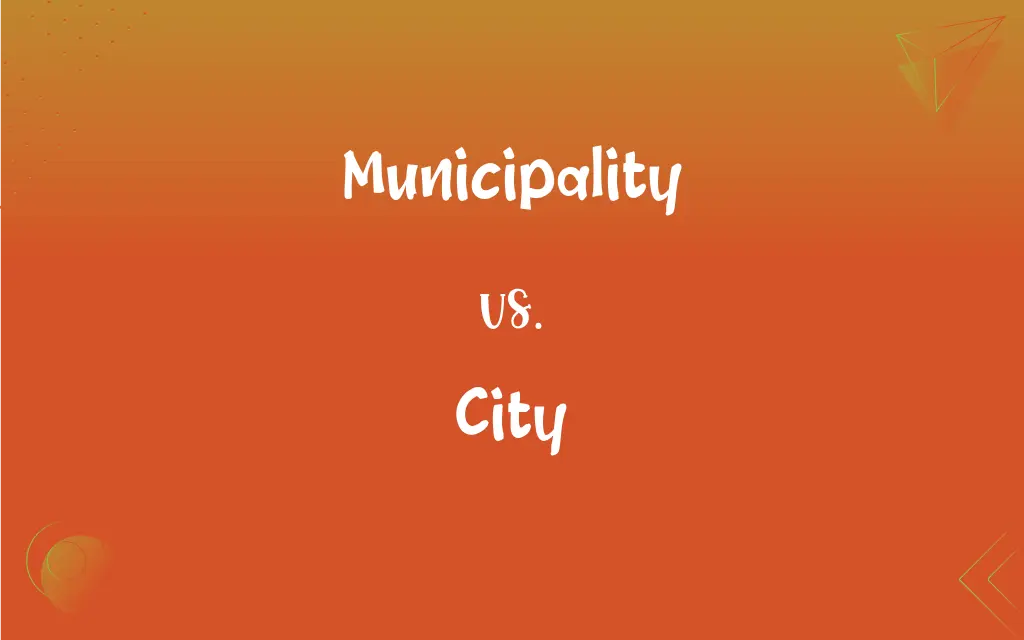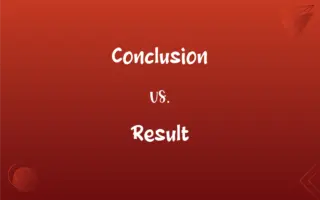Municipality vs. City: What's the Difference?
Edited by Harlon Moss || By Janet White || Updated on October 4, 2023
"Municipality" refers to an administrative division that may govern itself and may encompass cities, towns, or villages. "City" specifically refers to a large human settlement that is generally an administrative, commercial, and cultural hub.

Key Differences
"Municipality" is a generic term that describes an administrative unit that can self-govern and may include various types of settlements, such as cities, towns, and villages. "City," on the other hand, commonly denotes a specific type of settlement, typically one with a considerable population and importance.
Municipalities often have a governance structure that may include a mayor or a council, responsible for local administration and services. A "City" also possesses a governance structure, but it additionally signifies a notable scale and capability to support an extensive array of services and infrastructure.
Municipalities can vary widely in size and population, sometimes even encompassing rural areas. Cities are characterized by more densely populated environments and are often the hub of economic and social activities within a region or municipality.
The scope of "Municipality" can be broader, depending on the country, sometimes even holding multiple cities within its administrative jurisdiction. A "City" is restricted in its geographical and administrative scope, confined to its specific borders.
"Municipality" generally emphasizes the aspect of governance and administration of an area. In contrast, "City" inherently brings forth implications about its size, dynamics, infrastructure, and role in regional or national contexts.
ADVERTISEMENT
Comparison Chart
Definition
An administrative division that can govern its own affairs.
A large, densely populated urban settlement.
Size & Population
Can vary from small to large, fewer to many inhabitants.
Typically large with a substantial population.
Administrative Scope
May encompass towns, villages, or cities.
Is an individual urban entity.
Governance
Has a local government, may include a mayor and council.
Governed by a municipal corporation or similar.
Examples
Los Angeles County (encompasses multiple cities)
New York City
ADVERTISEMENT
Municipality and City Definitions
Municipality
A body of officials governing an administrative entity.
The municipality decided to build a new park for the community.
City
An entity recognized for its specified boundaries and governance.
The city limits were clearly defined to manage administrative responsibilities.
Municipality
A district or unit of local government in certain countries.
The municipality organized a festival for all its residents.
City
A populous area with significant socio-economic activities.
The city attracts numerous tourists with its historical landmarks.
Municipality
A region created for administrative and governmental purposes.
He submitted the required documents to the municipality office.
City
A large and permanent settlement usually characterized by a significant population.
The city is bustling with activity during the holiday season.
Municipality
A legal political or corporate entity formed for local governance.
The municipality decided to allocate funds for road repair.
City
An urban settlement that is typically a hub for commerce, culture, and administration.
The city offers numerous dining and entertainment options.
Municipality
An area with its own local government, possibly including multiple settlements.
The municipality oversees several small towns and villages.
City
A geographical area administered by a municipal government.
The city council voted in favor of the new law.
Municipality
A political unit, such as a city, town, or village, incorporated for local self-government.
City
A center of population, commerce, and culture; a town of significant size and importance.
Municipality
A body of officials appointed to manage the affairs of a local political unit.
City
An incorporated municipality in the United States with definite boundaries and legal powers set forth in a charter granted by the state.
Municipality
A district with a government that typically encloses no other governed districts; a borough, city, or incorporated town or village.
City
A Canadian municipality of high rank, usually determined by population but varying by province.
Municipality
The governing body of such a district.
City
A large incorporated town in Great Britain, usually the seat of a bishop, with its title conferred by the Crown.
Municipality
(politics) In Mexico and other Spanish- and Portuguese-speaking countries, second-level administrative divisions that may house one or more cities or towns whose head of government may be called mayors or, in Mexico, municipal presidents.
City
The inhabitants of a city considered as a group.
Municipality
A municipal district; a borough, city, or incorporated town or village.
City
An ancient Greek city-state.
Municipality
An urban district having corporate status and powers of self-government
City
(Slang) Used in combination as an intensive
The playing field was mud city after the big rain.
Municipality
People living in a town or city having local self-government
City
City The financial and commercial center of London. Used with the.
City
A large settlement, bigger than a town; sometimes with a specific legal definition, depending on the place.
São Paulo is the largest city in South America.
City
(UK) A settlement granted special status by royal charter or letters patent; traditionally, a settlement with a cathedral regardless of size.
City
(Australia) The central business district; downtown.
I'm going into the city today to do some shopping.
City
(slang) A large amount of something used after the noun.
It’s video game city in here!
City
A large town.
City
A corporate town; in the United States, a town or collective body of inhabitants, incorporated and governed by a mayor and aldermen or a city council consisting of a board of aldermen and a common council; in Great Britain, a town corporate, which is or has been the seat of a bishop, or the capital of his see.
A city is a town incorporated; which is, or has been, the see of a bishop; and though the bishopric has been dissolved, as at Westminster, it yet remaineth a city.
When Gorges constituted York a city, he of course meant it to be the seat of a bishop, for the word city has no other meaning in English law.
City
The collective body of citizens, or inhabitants of a city.
City
Of or pertaining to a city.
City
A large and densely populated urban area; may include several independent administrative districts;
Ancient Troy was a great city
City
An incorporated administrative district established by state charter;
The city raised the tax rate
City
People living in a large densely populated municipality;
The city voted for Republicans in 1994
FAQs
Can a municipality become a city?
Yes, depending on the jurisdiction, a municipality might achieve city status based on population, infrastructure, or other criteria.
How is a municipality governed?
Typically, a municipality is governed by elected officials, which can include a mayor, council, or committee.
What is a municipality?
A municipality is an administrative division or local government unit, often responsible for providing local services.
Are all municipalities urban areas?
No, municipalities can be urban, suburban, or rural in nature.
Are municipalities and counties the same?
No, they are distinct entities. A county may contain multiple municipalities within its boundaries.
What is the difference between a city and a town?
The distinction often relates to size, population, administrative significance, or legal definitions, which vary by jurisdiction.
How are cities governed?
Cities are typically governed by elected officials such as a mayor and a city council.
Do municipalities and cities have the same responsibilities?
Often, but it can vary. Both typically provide local services, but their range of responsibilities may differ based on size and jurisdiction.
Which is larger, a city or a municipality?
It's not about size. A city is often a type of municipality, and its size can vary greatly. A municipality can be larger or smaller than a city.
What defines a city?
A city is a large and permanent human settlement. Its exact definition varies by jurisdiction and can be based on population, legal status, or administrative function.
Are all cities municipalities?
In many places, cities are a type of municipality, but the terms are not always synonymous. The distinction varies by country and jurisdiction.
Can a city lose its status?
In some jurisdictions, cities can be demoted or lose their status based on population decline or other criteria.
Is the governance of municipalities and cities influenced by national or state/provincial governments?
Yes, higher tiers of government often set guidelines, provide funding, and influence local governance.
Can a city exist within another municipality?
Yes, in some jurisdictions, cities can be contained within larger municipal boundaries.
Do municipalities and cities collect their own taxes?
Typically, yes. They often have the power to levy taxes to fund local services.
Is every city a municipality?
Not always. While many cities are municipalities, the terms and structures vary by jurisdiction.
Why do we have municipalities and cities?
They serve to provide local governance, services, and representation to residents, addressing specific local needs.
Can a municipality or city establish its own laws?
To an extent. While they can establish local by-laws or ordinances, these must generally align with state/provincial or national laws.
Are the terms interchangeable?
Not always. While they can be similar in function, their legal and administrative definitions can differ by region.
How are boundaries determined?
Boundaries are often set by historical factors, legislation, or administrative decisions, and can be revised over time.
About Author
Written by
Janet WhiteJanet White has been an esteemed writer and blogger for Difference Wiki. Holding a Master's degree in Science and Medical Journalism from the prestigious Boston University, she has consistently demonstrated her expertise and passion for her field. When she's not immersed in her work, Janet relishes her time exercising, delving into a good book, and cherishing moments with friends and family.
Edited by
Harlon MossHarlon is a seasoned quality moderator and accomplished content writer for Difference Wiki. An alumnus of the prestigious University of California, he earned his degree in Computer Science. Leveraging his academic background, Harlon brings a meticulous and informed perspective to his work, ensuring content accuracy and excellence.































































